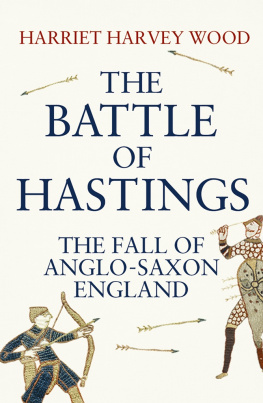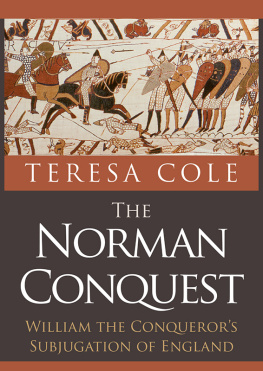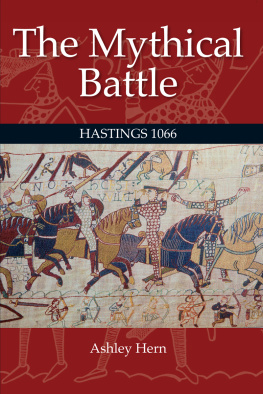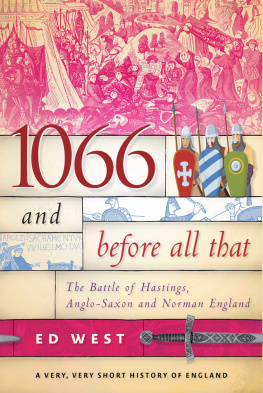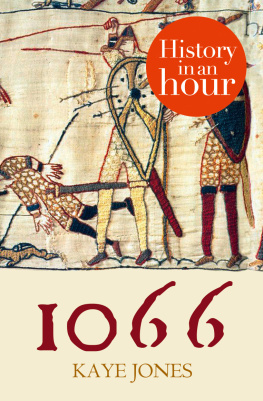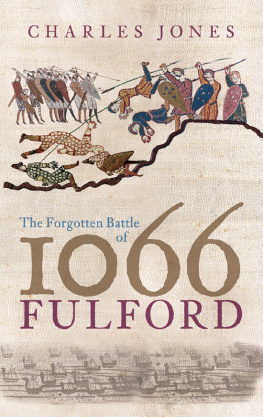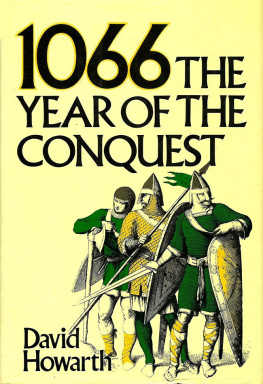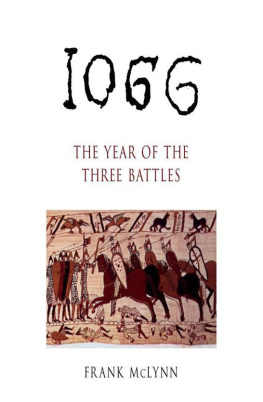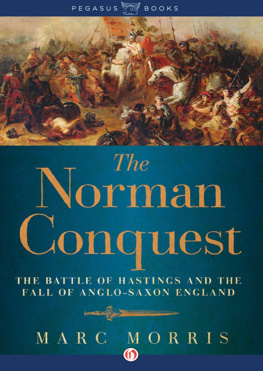THE BATTLE OF HASTINGS

First published in hardback in Great Britain in 2008 by
Atlantic Books, an imprint of Grove Atlantic Ltd.
First published in paperback in Great Britain in 2009 by
Atlantic Books, an imprint of Grove Atlantic Ltd.
Copyright Harriet Harvey Wood, 2008
The moral right of Harriet Harvey Wood to be identified as the author of this work has been asserted by her in accordance with the Copyright, Designs and Patents Act of 1988.
All rights reserved. No part of this publication may be reproduced, stored in a retrieval system, or transmitted in any form or by any means, electronic, mechanical, photocopying, recording, or otherwise, without the prior permission of both the copyright owner and the above publisher of this book.
Every effort has been made to trace or contact all copyright-holders. The publishers will be pleased to make good any omissions or rectify any mistakes brought to their attention at the earliest opportunity.
The picture acknowledgements constitute an extension of this copyright page.
1 3 5 7 9 8 6 4 2
A CIP catalogue record for this book is available from the British Library.
978 1 84354 807 2
eISBN 978 1 84887 309 4
Design by Lindsay Nash
Printed in Great Britain
Atlantic Books
An imprint of Grove Atlantic Ltd
Ormond House
2627 Boswell Street
London
WC 1N 3JZ
www.atlantic-books.co.uk
To my sister
William the Bastard, having driven out the legitimate king of the English, seized the kingdom.
Annales Corbeienses
O fools and sinners! Why did they not ponder contritely in their hearts that they had conquered not by their own strength but by the will of almighty God, and had subdued a people that was greater, and more wealthy than they were, with a longer history: a people moreover amongst whom many saints and wise men and mighty kings had led illustrious lives, and won distinction in many ways at home and on the battlefield?
Orderic Vitalis, Ecclesiastical History, book IV
LIST OF PLATES
INTRODUCTION
V ery few battles change history. The claim has been made for the battle of Waterloo, but Waterloo merely confirmed the course of a history that was clearly visible before it, but had been rudely interrupted by Napoleons re-entry on the European stage. It marked a turning-point; it was not a catalyst. The battle of Britain is, perhaps, a stronger contender. Or the battle of Lepanto. William Golding has, with some justice, claimed the distinction for Thermopylae, on the grounds that it won thirty years respite, enabling Athens to develop from a small provincial town to the city of Pericles that was to dominate the Mediterranean for centuries. If you were a Persian, he writes, you could not know that this example would lead, next year, to the defeat and destruction of your whole army at the battle of Plataea, where the cities of Greece fought side by side. Neither you nor Leonidas nor anyone else could foresee that here thirty years time was won for shining Athens and all Greece and all humanity.
Such a claim, if substantiated, means that what Leonidas and his Spartans achieved at Thermopylae ranks that desperate defence higher in its cultural implications than almost any other battle in history. John Stuart Mill claimed a similar distinction for the battle of Marathon, adding that it was more significant than the battle of Hastings, even as an event in English history, since it changed the whole basis of western civilization. It is perhaps impossible to make a comparable claim for the significance of the battle of Hastings but it cannot be denied that it too was a battle that was to change the face of Europe, and cause a fundamental realignment between its major players. It was, wrote one eminent historian of the Anglo-Saxon period, one of the rare battles that have decided the fate of nations. Crcy, Agincourt, Magna Carta and much more lay implicit in the early-morning mist that hung over Caldbec Hill on 14 October 1066. But whatever the consequences of the battle, one fact is undisputed: it wiped out overnight a civilisation that, for its wealth, its political arrangements, its arts, its literature and its longevity, was unique in Dark Age Europe, and deserves celebration. In the general instability, lawlessness and savagery of the times, Anglo-Saxon England stood out as a beacon. Yet the timing of the battle and its result were the consequences of a series of accidents that could not have been predicted by either of the commanders. William, when he fought it, was generally known throughout Europe as William the Bastard. It has been suggested that he might more accurately have been known as William the lucky bastard.
Its outcome was far from a foregone conclusion. Any bookie, invited to give odds on the result a month before, would not have rated Williams chances very high. The betting must always be against the invader of a country, especially when the invasion has to be by sea, and the defender is prepared for it. Had the winds been favourable and William been able to launch his attack even a month earlier, as he had hoped to do, it is highly likely that he would have been repelled with ignominy. Philip of Spains later attempt at an invasion of England failed because the winds blew, and his great Armada was scattered. The English lost the battle of Hastings not least because the winds did not blow in the right direction at the right time.
It was a battle that was much more fully documented in itself, in its causes and in its consequences than almost any other battle that took place in western Europe in the Dark Ages. It is notable that, even at the time, it was recognized as an event of enormous historical significance. There is no shortage of testimony as to the events that led up to it nor to the conduct of the battle. The problem is that with one exception all this body of testimony comes from the winning side. The only contemporary English account, in the Anglo-Saxon Chronicle, is stark in its simplicity:
Then came William Earl of Normandy into Pevensey on the eve of St Michaels mass, and as soon as he had disembarked his army, he built a castle at the port of Hastings. When this was told to King Harold, he gathered a great army and came against him at the hoar apple tree. And William came upon him unawares before his men were arrayed. But the king fought bravely against him with the men who would fight with him and there was much slaughter on either side. There were slain King Harold and Earl Leofwine his brother and Earl Gyrth his brother and many good men. And the Frenchmen held the place of slaughter. All as God granted it to them for the sins of the people.
On the Norman side there is, by contrast, almost a superfluity of accounts, both of the battle itself and of the events that led up to it. It will be important to establish (as far as possible) the status and interrelations of these, and a list of the most significant of them is provided in the Sources chapter. Ideally, it should be read before proceeding too far with the story, to understand the degree of authority of each. Through them it may be easier to see how it came about that King Harold lost a battle that it might have been thought impossible for him to lose and how the conquest and pillage of England took place under the banner and with the blessing of the Vicar of Christ.
This is a story that has often been told, and will go on being told as long as there are readers willing to read about it and writers to be drawn to its characters and events and to its insoluble puzzles and ambiguities. Almost all writers on the subject are partial on one side or the other and I am not less so than most. A recent eminent historian of the period has announced with his customary enthusiasm that, if he had been present, he would have been charging with William; I make no bones about stating that I would have stood beneath the standards of the Dragon of Wessex and the Fighting Man with Harold. For many years now the civilization of Anglo-Saxon England has seemed to me a wonderful and astonishing product of the late Dark Ages, a lamp to illuminate Europe, and its destruction at Hastings a matter for infinite regret. By 1066 it was an old civilization, and old civilizations tend to fall to energetic upstarts. With hindsight, and the advantages of modern research, it is possible to see how much of Anglo-Saxon England did actually survive the conquest, and that the combination of what survived with what was new produced a great deal that was equally worthwhile. But much also was lost.
Next page
